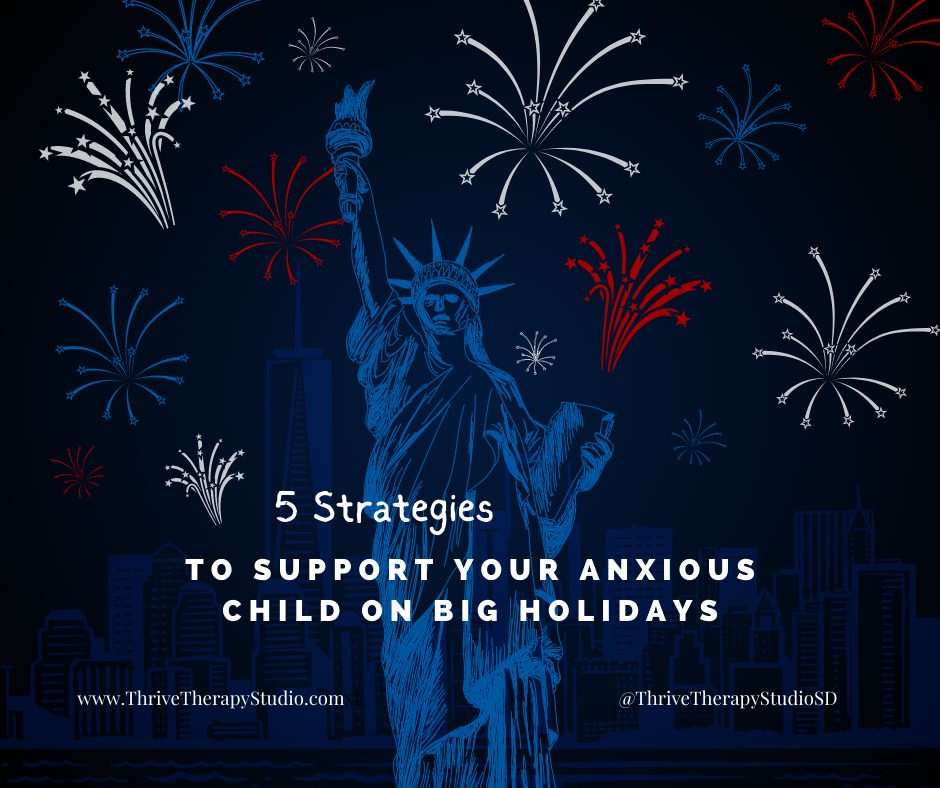Children who are more anxious can be naturally more impacted by holidays and big events, particularly days like the Fourth of July that often involve loud, at times unpredictable, fireworks. While it makes sense that this would be difficult for them, parents often forget that even fun events can feel really scary depending on your child’s personality, temperament, and possible anxious symptoms.
If your child has had a tough time in past holidays, these suggestions will help you manage the situation differently for this Fourth of July!
1. Make a plan. For children who are more anxious, it really helps to know what to expect. So, a key strategy to support them on a typically less structured day is to create some sense of structure and routine.
2. Stick to the plan. Making sure you keep your agreement, even if it seems that everyone is having fun, is a great way to build trust with your child. If they seem to be having a good time, you can pull them aside and discuss staying longer, but I would not recommend more than 30 minutes of a deviation from whatever schedule seemed good when you developed it. Only because sometimes kids can get carried away and think they are feeling okay but are building up toward a meltdown. Leaving on time can help prevent that. And also, it’s okay if your child does end up having a breakdown or some tears following a big event. For children, that is often a way to release their pent-up emotions.
3. Involve your child in developing the plan. Giving your child, particularly a more anxious child, a sense of control can be extremely helpful in navigating a day that can be overwhelming for them. Make sure to let them participate in developing your plan and deciding the day’s events.
4. Come up with an “exit strategy.” It can be extremely helpful to develop an “exit strategy” prior to attending a party, event outside, or even just a beach day. Sometimes it can be tough for kids (and hey, even adults at times) to know how to leave a situation when they become overwhelmed, tired, overstimulated, or just need to leave. If you have a conversation ahead of time about what to do in this situation and how to communicate it between you, that can really help make the day go more smoothly!
5. Let them know it is okay to have a hard time even if everyone else looks like they are having fun! This decision is kind of a tough one for many people. It is really important that we let our children know that their emotions, experiences, and reactions are totally okay. This validation is tough because, of course, we would prefer for our kids to have a great time all the time. And sometimes parents worry that if they let them know it is okay not to have a great time, they are somehow helping their child have LESS fun. I reassure you that this is not the case. Normalizing, or helping someone see that their reaction is okay and makes sense for them, is usually very helpful in alleviating any shame they experience as a result of feeling different. It might help to remind your child that, sure, it looks like everyone is having fun, but appearances can be deceiving, and also, there are plenty of people at home because they also do not prefer these types of events or days with so many people.
I hope this is helpful in preparing you for the festivities of the weekend and week to come! As always, if you need more support or have any questions about the topics shared in my blogs, please feel free to reach out to our team at Thrive for help! You can also sign up for our newsletter to stay updated on upcoming events and opportunities at Thrive!
Reach out to start
your healing journey


